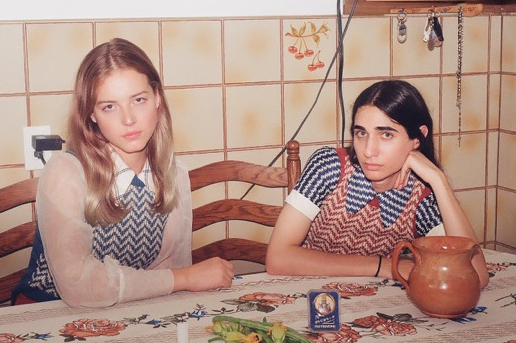Vox Populi
A curated webspace for Poetry, Politics, and Nature. Over 20,000 daily subscribers, 7,000 archived posts, 73 million hits and 5 million visitors.
Video: For Nonna Anna
As a young trans woman cares for her Italian grandmother, she discovers a tender bond in their shared vulnerability.
Cast: Maya Henry, Jacqueline Tarne, Anna Pecchia, Remy Barone
Director: Luis de Filippis
Running time: 13:21
Email subscribers may click on the title of this post to watch the film.
Winner of a Special Jury Prize in short film at Sundance 2018, “For Nonna Anna” is the tender story of a disabled elderly woman and her young trans granddaughter.
The film — which was directed by trans and non-binary filmmaker Luis de Filippis — depicts a slice of time when the two women are at opposite ends of their lives. Even so, feelings of vulnerability, insecurity, and low self-esteem surface within each of them, sparking an intimate and unexpected connection. In an interview with Meghan Oretsky, the director spoke about why they made the film and how audiences have reacted to it.
On the inspiration for the film:
“The idea for ‘For Nonna Anna’ came from my experience growing up with Italian grandparents. My nonna was illiterate, a highly devoted Catholic, and yet, she never shamed me for dressing in her clothes or clomping around the house in her heels. She supported my early gender expression wholeheartedly; her house was my safe space.
The story is also based on the collective memories and experiences of the women in my life. Specifically my mother’s stories of having to bathe my bisnonna (great-grandmother) — and how this woman had internalized shame for her aging body. My mother (who was pregnant with my brother at the time) could empathize. Her body was changing too, in ways she didn’t like.”
On why they made “For Nonna Anna”:
“I decided to make this film because I wanted to fill gaps in storytelling about trans people. We have seen too many stories that vilify, sensationalize, or eroticize our experiences. At best, most well-meaning films often focus on the mechanics of transition, with the film’s plot following this transformation or a ‘before and after’ arc. I really just wanted to tell a story about two women seeing their struggles and experiences reflected in one another’s eyes. The conversations of Chris’ identity have already happened, the family uses the right pronouns, and life goes on. That’s where this story starts.”

On what the film means to them:
“This film acted as a coming out for me. I had never told such a personal story, and it was my first project that I had written and directed on my own. It was also filmed on location at my nonna’s house — a place that is sacred to me. Making and sharing this film was quite terrifying, but it was also healing. It spoke all the things I was too terrified to say at a very critical time in my life.”
On audience reactions:
“What surprised me most was how much people connected with the characters. They really see themselves in Chris and Nonna; I think we all have a relationship or two where words are unnecessary. I was also surprised when people would say things like, ‘Oh, I didn’t know Chris was trans. She doesn’t look trans.’ It’s like, ‘What does looking trans even mean?’ I’m happy this film has been able to shift some people’s perspectives and understanding of what being trans is. Being trans is not just one thing. We and our experiences are varied and different and valid and beautiful.”
On celebrating otherness:
“It feels like as we get bolder and more determined to tell our stories, there’s more pushback. We must continue to reclaim our narratives, for somewhere out there, our stories are giving people hope and possibly changing lives. Film really does have the power to save, and when people tell their stories, they create a mirror that can reflect someone’s experiences. For too long, I never saw myself in any of the stories I took in. I thought I was alone, so I hid. As the growing wave of intolerance builds, I feel that my work can push back even in a small way. Hiding is not an option for me anymore.”
On advice for aspiring filmmakers:
“It may be a common piece of advice, but make the films you wish already existed. Figure out where the gap in storytelling is, and fill it. Also, keep it simple and work with what you have. Constraints are an amazing thing. They push you towards bolder filmmaking.”
On future projects:
“I’m working on a couple things right now, but the one I’m really excited for is a feature that’s based on a world of story similar to ‘For Nonna Anna.’”

Information
This entry was posted on August 21, 2021 by Vox Populi in Art and Cinema, Social Justice and tagged aging, Anna Pecchia, First Night Out, Jacqueline Tarne, LGBTQ, Luis de Filippis, Maya Henry, non-binary, Remy Barone, Sundance, trans, transexual.Shortlink
https://wp.me/p4xqzG-ay6Search
Search
Blog Stats
- 4,866,546
